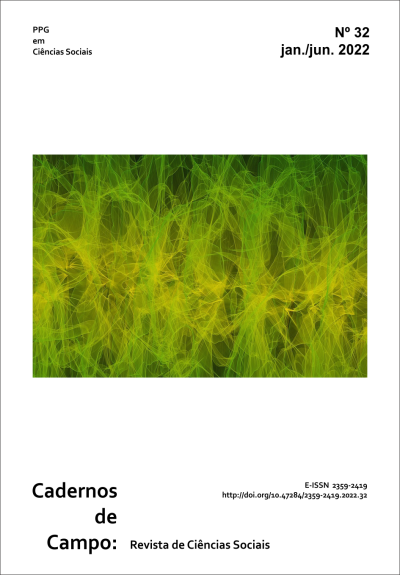The liberalism and the new interprets of Brazil
DOI:
https://doi.org/10.47284/2359-2419.2022.32.1941Keywords:
National State, liberalism, path dependenceAbstract
As an autonomous discipline, Brazilian Political Thinking is permeated by debates involving the influences that prevailed in the formation of the national state, as well as its impact on the historical path dependence of the performance of political institutions. Recent public debates, especially in the press, have reanalyzed the approach of this relevant theme, notably the controversy involving the political scientist Marcus Melo and the sociologist Jessé de Souza. The present article scrutinizes the positions expressed by each one of the polemicists mentioned, connecting them with the already rich tradition on the subject. The main conclusion is that the controversy analyzed still reverberates the deep division in this field of study on the adoption of the basic presuppositions of liberalism, aggravated by the strong illiberal tradition that permeates the historical-institutional trajectory of the Latin American countries, including Brazil.
Downloads
References
ACEMOGLU, D.; ROBINSON, J. Por que as nações fracassam: as origens do poder, da prosperidade e da pobreza. Rio de Janeiro: Elsevier, 2012.
ALSTON, L. et al. Brazil in Transition: beliefs, leadership, and institutional change. Princeton: Princeton University Press, 2016.
CORRALES, J. Autocratic Legalism in Venezuela. Journal of Democracy, Baltimore, v.26, n.2, p. 37-51, 2015.
DIAMOND, L. Thinking about Hybrid Regimes. Journal of Democracy, Baltimore, v.13, n.2, p. 21-35, 2002.
FAUSTO, R. Ainda a esquerda: resposta ao economista Samuel Pessoa. Revista Piauí, Rio de Janeiro, n.125, p. 57-61, 2017.
FAUSTO, R. Reconstruir a esquerda: um balanço crítico da experiência histórica e algumas ideias para o futuro. Revista Piauí, Rio de Janeiro, n.121, p. 42-58, 2016.
GAMBOA, La. Venezuela: aprofundamento do autoritarismo ou transição para a Democracia? Relações Internacionais, Lisboa, n.52, p. 55-66, 2016.
GASPAR, M. A organização: a Odebrechet e o caso de corrupção que chocou o mundo. São Paulo: Companhia das Letras, 2020.
GRAYCAR, A. Corruption: classification and analysis. Policy and Society, Amsterdam, v.34, n.2, p. 87-96, 2015. Disponível em: 10.1016/j.polsoc.2015.04.001. Acesso em: 20 jan. 2019.
HERITAGE FOUNDATION. Index of Economic Freedom 2019. Washington: Heritage Foundatio, 2019. p. 1-5, 2019. Disponível em: https://www.heritage.org/index/pdf/2019/book/index_2019.pdf. Acesso em: 1 jul. 2019.
KORNBLITH, M. Chavismo after Chávez? Journal of Democracy, Baltimore, v.24, n.3, p. 47-61, 2013.
KURER, O. Why do voters support corrupt politicians? In: JAIN, A. K. (org.). The Political Economy of Corruption. New York: Routledge, 2001. p. 63-86.
LEVINE, D.; MOLINA, J. E. Calidad de la Democracia en Venezuela. America Latina Hoy, Salamanca, v.62, p. 157-175, 2012.
LEVINE, D. The decline and fall of Democracy in Venezuela: ten theses. Bulletin of Latin American Research, Hoboken, v.21, n.2, p. 248-269, 2002.
MELO, M. A. Lava Jato. Folha de São Paulo, São Paulo, 24 jun. 2019a, p. 1-2. Disponível em: https://www1.folha.uol.com.br/colunas/marcus-melo/2019/06/lava-jato.shtml. Acesso em: 19 jan. 2020.
MELO, M. A. A democracia liberal no Brasil. Folha de São Paulo, São Paulo, 07 jan. 2019b, p. 1-3. Disponível em: https://www1.folha.uol.com.br/colunas/marcus-melo/2019/01/a-democracia-liberal-no-brasil.shtml. Acesso em: 19 jan. 2019.
MELO, M. A. A Malaise política no Brasil: causas reais e imaginárias. Journal of Democracy, Baltimore, v.6, n.2, p. 69-95, 2017.
MELO, M. A. Raízes do Brasil político: os caminhos de um projeto iliberal. Folha de São Paulo, São Paulo, 31 jan. 2016. Ilustríssima, p.1-6. Disponível em: www1.folha.uol.com.br/ilustrissima/2016/01/1734970-raizes-do-brasil-politico-os-caminhos-de-um-projeto-iliberal.shtml. Acesso em: 29 abr. 2019.
MELO, M. A. Tempestade perfeita ameaça o governo Dilma, diz acadêmico: entrevista a Fernando Canzian. Folha de São Paulo, São Paulo, 23 fev. 2015, p. 1-4, 2015. Disponível em: https://www1.folha.uol.com.br/poder/2015/02/1593286-tempestade-perfeita-ameaca-o-governo-dilma-diz-academico.shtml. Acesso em: 20 jul. 2019.
MORAES, C. Quando o PT estava do outro lado: a sigla lidera pedidos de impeachment. El País, São Paulo, 18 abr. 2016, p. 1-4. Disponível em: https://brasil.elpais.com/brasil/2016/04/18/politica/1460937256_657828.html. Acesso em: 04 fev. 2020.
NETO, L. Getúlio 1945-1954: da volta pela consagração popular ao suicídio. São Paulo: Companhia das Letras, 2014.
NORTH, D. Custos de transação, instituições e desempenho econômico. Rio de Janeiro: Instituto Liberal e Instituto Millenium, 2006.
PESSOA, S. A armadilha em que a esquerda se meteu. Revista Piauí, n.123, Rio de Janeiro, p. 38-42, 2016.
POPPER, K. A sociedade aberta e seus inimigos. Belo Horizonte: Itatiaia, 1988. v.2.
RANGEL, C. Do bom selvagem ao bom revolucionário. São Paulo: Faro Editorial, 2019.
SANTOS, W. G. O paradoxo de Rousseau: uma interpretação democrática da Vontade Geral. Rio de Janeiro: Rocco, 2007.
SELIGSON, M. A. The measurement and impact of corruption victimization: survey evidence from Latin America. World Development, Amsterdam, v.34, v.2, p. 381-404, 2006.
SILVA, H. Nasce a República – 1888/1894. São Paulo: Grupo de Comunicação Três AS, 1998.
SOUZA, J. A elite do atraso: da escravidão a Bolsonaro. Rio de Janeiro: GMT, 2019.
SOUZA, J. Escravidão, e não corrupção, define a sociedade brasileira. Folha de São Paulo, São Paulo, 22 set. 2017. Ilustríssima, p. 1-4. Disponível em: www1.folha.uol.com.br/ilustrissima/2017/09/1920559-escravidao-e-nao-corrupcao-define-ciedade-rasileira-diz-jesse-souza.shtml. Acesso em: 24 abr. 2019.
SOUZA, J. A quem serve a classe média indignada? Folha de São Paulo, São Paulo, 10 jan. 2016. Ilustríssima, p. 1-8. Disponível em: www1.folha.uol.com.br/ilustrissima/2016/01/1727369-a-quem-serve-a-classe-media-indignada.shtml. Acesso em: 29 abr. 2019.
URRIBARRÍ, R. Venezuela (2015): un Régimen Híbrido en Crisis. Revista de Ciência Política, Santiago, v.36, n.1, p. 365-381, 2016.
URRIBARRÍ, R. Courts between Democracy and Hybrid Authoritarianism: evidence from the Venezuelan Supreme Court. Law & Social Inquiry, Cambridge, v.36, n.4, p. 854-884, 2011.
TREISMAN, D. The causes of corruption: a cross-national study. Journal of Public Economics, Amsterdam, v.76, p. 399-457, 2000.
WEITZ-SHAPIRO, R.; WINTERS, M. Political corruption and partisan engagement: evidence from Brazil. Journal of Politics in Latin America, Hamburgo, v.7, n.1, p. 45-81, 2015.
Downloads
Published
Issue
Section
License
Copyright (c) 2022 Cadernos de Campo: Revista de Ciências Sociais

This work is licensed under a Creative Commons Attribution 4.0 International License.









